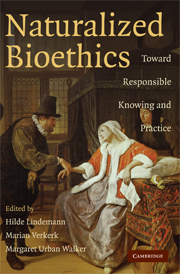Book contents
- Frontmatter
- Contents
- Contributors
- Acknowledgments
- Naturalized Bioethics
- Introduction: Groningen Naturalism in Bioethics
- I RESPONSIBLE KNOWING
- II RESPONSIBLE PRACTICE
- 7 Motivating Health: Empathy and the Normative Activity of Coping
- 8 Economies of Hope in a Period of Transition: Parents in the Time Leading Up to Their Child's Liver Transplantation
- 9 Consent as a Grant of Authority: A Care Ethics Reading of Informed Consent
- 10 Professional Loving Care and the Bearable Heaviness of Being
- 11 Ideal Theory Bioethics and the Exclusion of People with Severe Cognitive Disabilities
- 12 Epilogue: Naturalized Bioethics in Practice
- Bibliography
- Index
11 - Ideal Theory Bioethics and the Exclusion of People with Severe Cognitive Disabilities
Published online by Cambridge University Press: 05 June 2012
- Frontmatter
- Contents
- Contributors
- Acknowledgments
- Naturalized Bioethics
- Introduction: Groningen Naturalism in Bioethics
- I RESPONSIBLE KNOWING
- II RESPONSIBLE PRACTICE
- 7 Motivating Health: Empathy and the Normative Activity of Coping
- 8 Economies of Hope in a Period of Transition: Parents in the Time Leading Up to Their Child's Liver Transplantation
- 9 Consent as a Grant of Authority: A Care Ethics Reading of Informed Consent
- 10 Professional Loving Care and the Bearable Heaviness of Being
- 11 Ideal Theory Bioethics and the Exclusion of People with Severe Cognitive Disabilities
- 12 Epilogue: Naturalized Bioethics in Practice
- Bibliography
- Index
Summary
What distinguishes ideal theory is the reliance on idealization to the exclusion, or at least marginalization, of the actual. … [I]deal theory either tacitly represents the actual as a simple deviation from the ideal, not worth theorizing in its own right, or claims that starting from the ideal is at least the best way of realizing it.
– Charles W. Mills, “ ‘Ideal Theory’ As Ideology”Onora O'Neill (1987, 41, 42) writes that idealization “can easily lead to falsehood.” She points out that idealizations, particularly idealizations of persons, are especially problematic in the arena of practical reasoning. The difficulty is that “if the world is to be adapted to fit the conclusions of practical reasoning, and these assume certain idealizations, the world rather than the reasoning may be judged at fault. More concretely, agents and institutions who fail to measure up to supposed ideals may be blamed for the misfit.” In this chapter I suggest that, at times, the omissions and problematic conclusions that result from idealizations are truly moral lapses in the practice of ethics itself. The theories under consideration are typical of a brand of philosophical bioethics that depends heavily on idealizations and hypothetical examples. In the name of simplification, hypotheticals and hyperboles, employing empirically inadequate descriptions drawn from stereotypes, are used to explore and illuminate intuitions. The effects of the idealizing assumptions on the outcomes, however, are rarely examined.
- Type
- Chapter
- Information
- Naturalized BioethicsToward Responsible Knowing and Practice, pp. 218 - 237Publisher: Cambridge University PressPrint publication year: 2008
- 18
- Cited by



